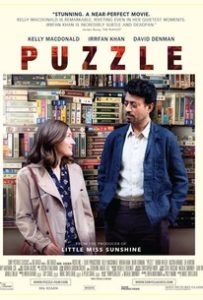Puzzle
Posted on July 26, 2018 at 5:08 pm
B +| Lowest Recommended Age: | Middle School |
| MPAA Rating: | Rated R for language |
| Profanity: | Some strong language |
| Alcohol/ Drugs: | Alcohol, drug references |
| Violence/ Scariness: | Tense family confrontations |
| Diversity Issues: | Diverse characters |
| Date Released to Theaters: | July 27, 2018 |
| Date Released to DVD: | November 12, 2018 |

Kelly McDonald is exquisite as Agnes, a Catholic woman who lives with her husband and their two sons in the house she grew up in. We first see her preparing for a party, and then we learn it is her own birthday party. She may be the guest of honor, but she is still doing all of the cooking, decorating, and serving. Her husband and sons love her without paying much attention to her.
One of her birthday gifts is a crossword puzzle. She completes it, and somehow, it completes her. And then it shows her how incomplete her life has been. She has spent decades in the same small, Catholic community. The puzzle inspires her to do something daring — take the train into Manhattan to buy another. And when she sees a notice that someone is looking for a “puzzle partner,” she does something even more daring. She lies to her family so she can find out more.
Screenwriter Oren Moverman (“Love and Mercy,” “The Dinner”) adapted the screenplay from Argentine director Natalia Smirnoff’s “Rompecabezas.” Director Marc Turtletaub gives the film a timeless quality. From the look of her home and her clothes, Agnes seems to be living a generation ago. It is a shock when one of her other birthday presents is an iPhone. She looks at it as though it was delivered by a messenger from the future. “I have a radio and a window,” she tells her son. “I know when it is going to rain.” She calls the iPhone an “alien robot.”
We see that this is a choice Agnes has made, to live in a cocoon of the past, to avoid questioning her choices because she does not want to think about the answers. Why is it puzzles, as her husband says, something for children, that inspire her to think for the first time that maybe she should look outside her home? Or make her speak up for herself and for her son? It could have been cooking difficult recipes like “Julie & Julia” or learning to drive as in “Driving Lessons” or gardening as in “Greenfingers.” It does not matter what it is that pulls characters out of themselves to take risks and learn more; what matters is whether it does and whether the story about how it does inspires that in us.
And what matters here is McDonald. Much of the movie is just her face, luminous, open, a little bit fearful, a little bit joyful. The film is wise in its exploration of the things we do to quiet our minds, even when the result is to hide from ourselves, not peace but numbness. It understands that people and even movies themselves are puzzles that, if we put the pieces together thoughtfully, give us connection, meaning, and purpose.
Parents should know that this film has some strong language, family tension, references to drug use, smoking, drinking, and a non-explicit sexual situation.
Family discussion: Why did Agnes suddenly want to learn about the news? What will she do next?
If you like this, try: “Driving Lessons”
